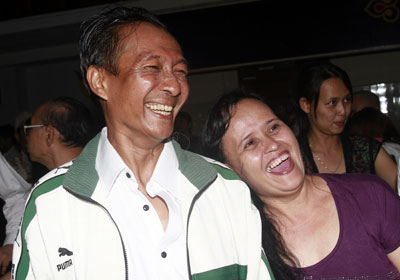When President Thein Sein pardoned over 300 political prisoners last week in Burma, CPJ reported that at least nine journalists were among those released. Since then, the exile-run Democratic Voice of Burma (DVB) has announced that all of its jailed reporters, including a group of eight who had remained anonymous, are now free.
Thirteen DVB reporters were released in total under the January 13 presidential pardon; another four of the news organization’s undercover journalists were released under a separate amnesty last year. At least three journalists who worked for other organizations are still in prison.
Last May, DVB launched its Free Burma VJ campaign to raise public awareness about its 17 jailed reporters and pressure Thein Sein’s democratically elected, military-backed government for their immediate and unconditional release.
The campaign focused on five jailed reporters — Hla Hla Win, Sithu Zeya, Maung Maung Zeya, Ngwe Soe Lin, Win Maw — identified by name, but left 12 others anonymous due to concerns Burmese authorities might extend their sentences if it was discovered they worked undercover for DVB.
DVB’s hard-hitting documentaries, including award-winning reportage of the previous Gen. Than Shwe-led government’s lethal crackdown on Buddhist monk-led protests in 2007 and its ineffectual response to the 2008 Cyclone Nargis disaster, were by necessity reported secretly and released under pseudonyms or without bylines.
Than Shwe’s oppressive military junta frequently referred to DVB as an “enemy of the state”, and the many surveillance measures implemented for the Internet after 2007 were interpreted as a response to local journalists secretly filing censorship-dodging reports to outside and exile-run media such as DVB.
Now, with all DVB’s jailed reporters released, the question is whether Thein Sein’s supposedly reformist regime will allow them to report and file freely, without fear of reprisal and a return to prison. His nominally civilian government has allowed reporting on certain previously banned topics but still pre-censors all news-related publications and dominates the broadcast media.
There are reasons to be skeptical: released DVB reporter Sithu Zeya, who was sentenced to 18 years for reporting on a 2010 bomb attack, was freed on the condition that he must serve his full sentence if he is convicted of any crime. Until the various laws used to oppress and jail journalists are amended or abolished, what constitutes a crime will remain highly arbitrary and hang over all Burmese reporters like a Sword of Damocles.
[Reporting from Bangkok]
